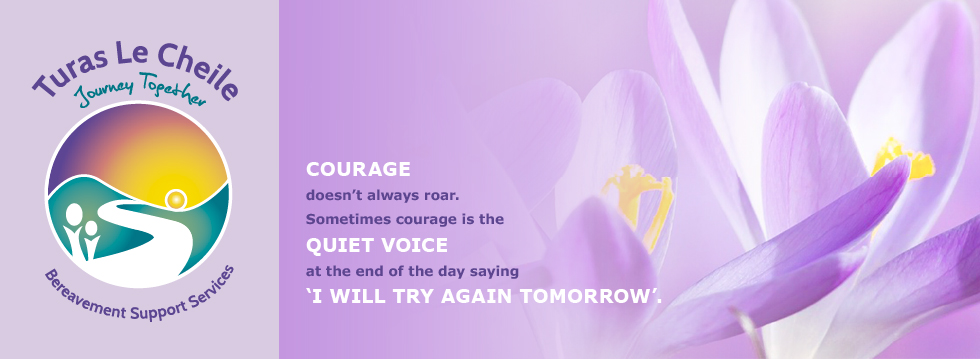The words we use:
Even though bereavement is probably a word you have heard a lot, it might be helpful to be clear about what exactly it means. Bereavement is the word used to describe the emotional journey we go on when someone we care about dies. We can have strong feelings and emotions and this is called grief.
Most of us have had the experience of losing things from time to time in our lives. Sometimes it might be something small or unimportant and other times it can be something much more valuable and important. Have you noticed that the more value and importance we place on that thing we have lost, the stronger we feel about losing it. For example, if you lose a pen from your school bag your feeling is loss is likely to be far less than if you lose the ticket you got to see your favourite band in concert. When we think about it in that way we can begin to see that when we lose a person who is important in our lives the feelings we are likely to have will be very strong.
It is normal to have a variety of feelings:
Have you noticed that we tend to only talk about or even think about feelings when the feelings we are having are unpleasant or when things are not going well? Yet, we are all having feelings all of the time. At any time, you might feel bored, or angry or fed up or sad or happy. Indeed you might feel lots of feelings and some of them might even contradict others. You could feel happy that your friend called but disappointed that they picked the very time that you had planned to do something else. Even though feelings like happiness, excitement, delight tend to be promoted in the media and the social media as the “normal” feelings to have, it is, in fact, normal to be able to feel the whole range of feelings.
It can be more helpful to think that if our feelings fit with whatever is going on in our lives then they are the right feelings to have. When someone we care about dies, it is common and normal for us to have lots of feelings. While you might expect to feel sadness or shock, people are sometimes surprised at feeling anger or rage or guilt or fear or even to feel numb, as though they can’t feel anything at all. But it is not unusual for people to have these feelings, they are all part of grieving. When you think about it, it makes sense that people can feel all of these. When someone dies, we may feel shock at the suddenness of their death and sadness that they are no longer physically present, but death invites us to think about all sorts of things in ways that we may not have thought before and can bring worries about things we may not even have thought about before, such as our health or the health of others.
During a time of bereavement, just as during any time in life, it is possible for us to feel every possible emotion. Don’t think that there is something wrong with you if you even have times when you feel happiness. Remember, our feelings are very complicated when we take the time to get to know them.
Coping with grief:
Even though we have some understanding of the kinds of feelings and experiences that are common or typical for people who are going through a bereavement, it is important to keep in mind that we are all unique individuals and all have our own ways of dealing with things. You will see that among your friends or family.
Some people like to talk when they have something on their mind, others like to keep to themselves and others like to do things or get busy distracting themselves from whatever it is that is bothering them. Dealing with the death of someone we care about is no different, so we all deal with grief in own unique way too. There is no right or wrong way to deal with grief and there is no time limit. We can all be allowed the time and space for our own journey. While people have used phrases like ‘getting over’ a death or ‘getting on with things’, they can feel unhelpful. What do they even mean? It might be more useful to think that grieving is about finding a way to bring whatever was precious about the person who has died, maybe special thoughts, memories or feelings about the person, with us through life when the person is no longer physically here.
Even within families and groups of friends, the relationships between no two people is ever the same. Because of that, we all have our own individual journeys through bereavement. No one else has had the same relationship with the person who has died that you have had. Often we discover that what was most precious about the person was the way they made us feel, or the way we felt when we were with them, or the things that they saw and admired or valued in us. It can be really important to keep that connection because it can help to motivate us to behave in ways that are an important part of who we are. There are times when people feel very connected to a person who has died when they keep up some activity that they used to do with the person or that they enjoyed hearing about.
Sometimes people think that if they did not have the best relationship with the person who has died, then they might not have much of an emotional reaction when the person dies, but, it can be the complete opposite. It can seem like the death takes away any possibility of the relationship improving and that can add to the sense of loss.
Signs you may need extra help:
We know that grieving is a normal response to losing someone who is important to us and that the journey through grief is a painful one. We also know that while each person’s experience of grief is unique and individual, it is helpful to keep up contact with others and to keep up involvement with the things that are a normal part of life – even if you don’t particularly feel like it. However, sometimes coping with a bereavement can feel just too difficult. It might be that it comes on top of other stresses, like preparing for exams, or difficulties with friends or family, or maybe the loss feels too hard to cope with. When that happens it may be best to get some extra help. It can be hard to know if what you are going through is normal, or if it might be time to get some extra help. Sometimes our behaviour and actions can give us a hint. The following can be hints that some extra help may be needed:
- If your sleep pattern is disturbed over a period of time
- If you find your appetite has changed and you are either over eating or not eating enough
- If you find yourself avoiding friends and family
- If you are avoiding activities that you were previously involved in
- If you find yourself losing your temper too easily and getting into fights or arguments more than normal
- If you find that you are almost constantly thinking about the loss of the person who has died and can hardly think of anything else.
If as you read this list, you think that you or someone you know might need some extra help it is often best to start by talking with an adult you know and trust. That person may be able to provide the support you need. However, if you or they feel that it might be more helpful to seek support from someone else it is important to know that you can contact Turas Le Cheile and there is always additional support available.



